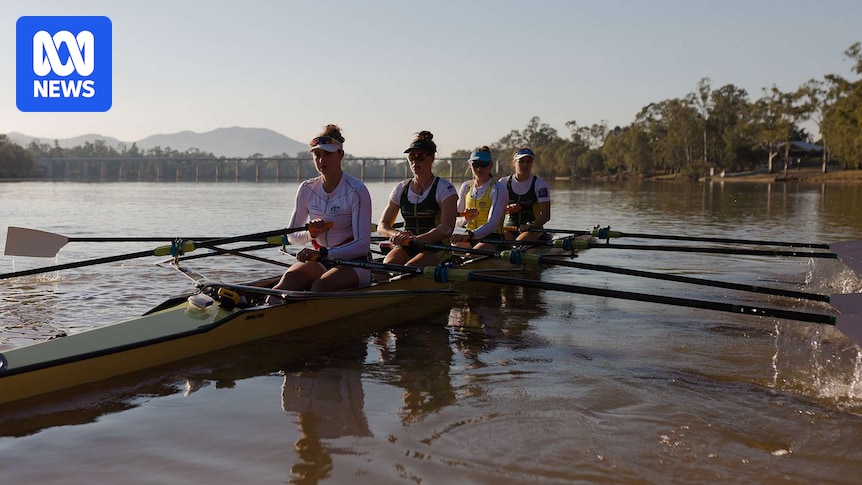
Today marks a significant milestone for Queensland as it counts down seven years to the 2032 Olympic and Paralympic Games. Premier David Crisafulli celebrated the occasion by taking to the waters of the Fitzroy River in Rockhampton, the proposed site for the rowing and canoeing events. However, the decision to use the Fitzroy River has sparked controversy, with concerns about its ability to meet international standards.
The Fitzroy River, the largest river catchment flowing to Australia’s east coast, has been selected by the state government to host these prestigious events. Yet, national and international bodies have raised alarms, suggesting the river may not meet the stringent criteria set by rowing’s governing authorities.
Technical Testing and Government Commitment
In response to these concerns, the Games Independent Infrastructure and Coordination Authority (GIICA) has initiated technical testing of the river. This move aims to ensure that the venue can be transformed into a world-class facility. Premier Crisafulli emphasized the government’s dedication to making Rockhampton a suitable host for the rowing events.
“Rowing is happening in Rocky, and we’re putting in place the steps to make sure we can build a world-class venue,” said Premier Crisafulli. “That’s what good governments do, and that’s our commitment to the people, not just of central Queensland, but to the nation.”
The government plans to use the results from these tests, which assess water flows and depths, to convince World Rowing officials of the river’s suitability. A separate technical assessment by World Rowing officials is also scheduled.
Expert Opinions and Environmental Considerations
Dr. Shaneel Chandra, a senior lecturer in chemistry at CQUniversity and former acting chief scientific officer in the Office of the Great Barrier Reef, supports the testing efforts. He believes that with appropriate controls, the Fitzroy River can meet international standards.
“I believe that with the right controls, the Fitzroy River will be able to meet the international standards overall,” Dr. Chandra stated. “There are active management programs in place from weeds to water quality already being monitored, and I have no doubt these efforts will be ramped up in the lead-up to the Games.”
Beyond water quality, the river’s status as a crocodile habitat adds another layer of complexity. Premier Crisafulli acknowledged that crocodile management would be a crucial part of the venue’s assessment process.
Infrastructure Development and Future Plans
While the river’s suitability remains under scrutiny, the broader preparations for the 2032 Games continue. It has been four years since Brisbane was awarded the right to host the event, and significant infrastructure projects are still in the planning stages. Premier Crisafulli remains optimistic, citing historical precedents.
“At this point, seven years out, Sydney hadn’t even been awarded the Games yet,” he noted. “So we do have time, and we’ve got a plan to execute it, and we are going to deliver generational opportunities for this state.”
Meanwhile, the state government has opened expressions of interest for the development of the new Victoria Park precinct, which will include a 63,000-seat stadium, the National Aquatic Centre, and an athletes’ village. Deputy Premier Jarrod Bleijie described it as a “once-in-a-lifetime opportunity” for industry leaders to contribute to Queensland’s largest infrastructure legacy.
Simon Crooks, recently appointed to lead these projects, expressed confidence in meeting the timeline. “To be honest, my job is to get on and get delivering, to start work on getting people pushing shovels in the ground and working,” he said. “I think seven years is perfectly achievable.”
Financial Considerations and Political Debate
The state government has reiterated its commitment to delivering the Games within the $7.1 billion joint funding envelope agreed with the Commonwealth. However, Premier Crisafulli has been reticent about the specific costings of projects like the National Aquatic Centre, drawing criticism from the opposition.
“That’s what’s called being in government,” said Shadow Treasurer Shannon Fentiman. “You release cost estimates, and it is so important when you’re investing billions of taxpayer funds that you can at least give some indication to taxpayers what these venues are going to cost.”
As Queensland continues its preparations, the countdown to the 2032 Games presents both challenges and opportunities. The state government remains steadfast in its vision to deliver a successful and memorable Olympic experience, promising to address the concerns and capitalize on the potential benefits for the region.





